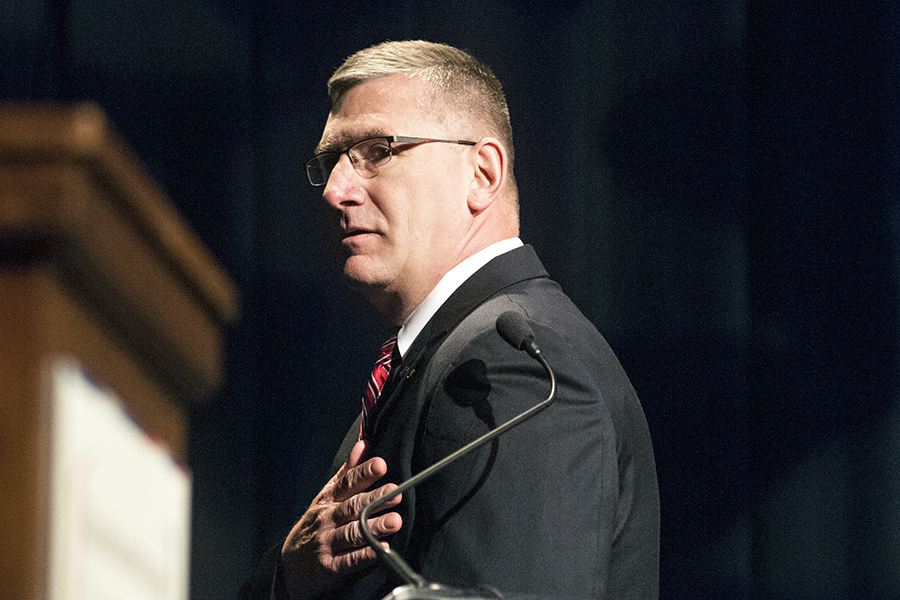HELENA — Montana U.S. Sen. John Walsh dropped his election campaign Thursday amid allegations he plagiarized large portions of a 2007 research project, leaving fellow Democrats to scramble for a replacement with the election less than three months away.
Nationally, the development only improves the odds for Republicans, who need a net gain of six seats in November to take Senate control. Even before Walsh’s exit, strategists in both parties considered his Senate race against U.S. Rep. Steve Daines an opportunity to tip one more seat in Republicans’ favor.
The Montana Democratic Party must hold a nominating convention before Aug. 20 to choose a replacement candidate.
Notably absent from any list of candidates will be former Gov. Brian Schweitzer, whose name had circulated as a promising potential contender even before Walsh’s announcement. The two-term Democratic governor shot down the possibility in social media postings Thursday. He later confirmed that he would not run in a message to The Association Press.
Schweitzer also declined a chance to run earlier this year, when he said he wasn’t interested in the seat that opened when six-term Sen. Max Baucus was named U.S. Ambassador to China.
Walsh was appointed to fill Baucus’ seat in February. The former National Guard commander said in a statement to supporters Thursday that he was leaving the race but will stay in office until his term ends in January 2015.
Walsh said the controversy surrounding his U.S. Army War College research paper had become a “distraction.”
“I am ending my campaign so that I can focus on fulfilling the responsibility entrusted to me as your U.S. Senator,” he said. “You deserve someone who will always fight for Montana, and I will.”
His campaign declined interview requests.
The announcement came as an Army War College investigation is set to begin Aug. 15 into Walsh’s college paper. The senator previously said he wrongfully cited some passages in the work, but not deliberately. Lee Newspapers of Montana first reported Walsh’s departure from the race.
The decision is a boost for Daines, a former technology company executive from Bozeman who is giving up his House seat after one term to run for Senate.
The Republican said Thursday he respected Walsh’s decision. He wouldn’t comment on the plagiarism allegation other than to say it was between Walsh and Montanans.
Daines has maintained a sizable fundraising advantage, raising $3.6 million since last fall, his campaign said last month. Walsh had raised nearly $2.8 million, according to his campaign.
The upcoming nominating convention for a replacement will be comprised of Democratic leaders from county party committees, along with federal and statewide elected officials and the party’s executive board.
Montana State University political analyst David Parker said Walsh made the right choice for his family given the huge amount of media attention surrounding the plagiarism charges. But he said it puts Democrats in a bind for November.
“I’m not sure the seat is winnable for Democrats,” Parker said. “It was always a tough race in a tough electoral environment. Putting out a candidate with three months to have to introduce himself to the state, that’s hard.”
The New York Times revealed the extensive use of unattributed material in Walsh’s paper about the spread of democracy in the Middle East. Walsh originally called it an “unintentional mistake” and told the AP part of the fault might lie in his being treated for symptoms of post-traumatic stress disorder following his deployment in Iraq.
He later said he was not blaming PTSD for his mistake.
The pressure on Walsh’s campaign grew after the revelations, with the editorial boards of Montana’s three largest daily newspapers calling for him to withdraw his candidacy over the past two weeks.
Meanwhile, senior Democrats in Washington publicly supported their expected nominee but did little to help Walsh and took an arms-length approach as he contemplated his decision.
Montana’s other senator, Democrat Jon Tester, issued a statement lauding Walsh’s service to Montana and the country, and saying he knew the decision was a difficult one.
Appointed by Gov. Steve Bullock, Walsh is the only senator who served in the Iraq war. He spent 33 years in the Montana National Guard and received the Master of Strategic Studies degree from the war college at age 47, a year before he became adjutant general overseeing the Guard and the state Department of Military and Veterans Affairs.
He was elected as Bullock’s lieutenant governor in 2013.
Bullock said Thursday it was unfortunate that more attention is given to a candidate’s flaws than to the good they can do.
“No man should be judged based on his best or his worst days, yet rather over a lifetime,” Bullock said. “As a husband, father, soldier and public servant, my friend John Walsh has earned my respect and appreciation.”
